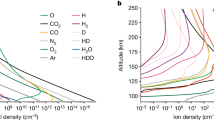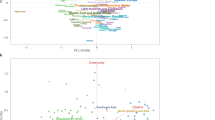Abstract
IN his excellent chronological review book of observations, The Planet Saturn, Alexander1 compares the outer, “D” ring of Saturn to the Loch Ness Monster: some see it, and some do not. During the second half of the nineteenth century a number of visual observations were reported by experienced observers but the issue seems to have been settled by Barnard2 in 1909, using the 40 in. Yerkes refractor visually and getting negative results. Apparently few, if any, attempts have been made photographically to detect a ring outside the well known A, B and C rings.
This is a preview of subscription content, access via your institution
Access options
Subscribe to this journal
Receive 51 print issues and online access
$199.00 per year
only $3.90 per issue
Buy this article
- Purchase on Springer Link
- Instant access to full article PDF
Prices may be subject to local taxes which are calculated during checkout
Similar content being viewed by others
References
Alexander, A. F. O'D., The Planet Saturn (Macmillan, New York, 1962).
ibid. 317.
Alfven, H., On the Origin of the Solar System (Clarendon Press, Oxford, 1954).
Ellison, W. F. A., quoted in ref. 1, 344.
Author information
Authors and Affiliations
Rights and permissions
About this article
Cite this article
FEIBELMAN, W. Concerning the “D” Ring of Saturn. Nature 214, 793–794 (1967). https://doi.org/10.1038/214793a0
Received:
Issue Date:
DOI: https://doi.org/10.1038/214793a0
This article is cited by
-
Circumplanetary Dust Populations
Space Science Reviews (2019)
-
Dust Emission by Active Moons
Space Science Reviews (2018)
-
The dynamical evolution of Saturn's E-ring
Earth, Moon, and Planets (1986)
-
Dynamics of ring-satellite sytems around saturn and uranus
Celestial Mechanics (1984)
-
Distribution of neutral gas and dust near Saturn
Nature (1981)
Comments
By submitting a comment you agree to abide by our Terms and Community Guidelines. If you find something abusive or that does not comply with our terms or guidelines please flag it as inappropriate.



